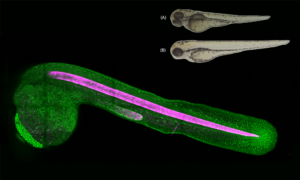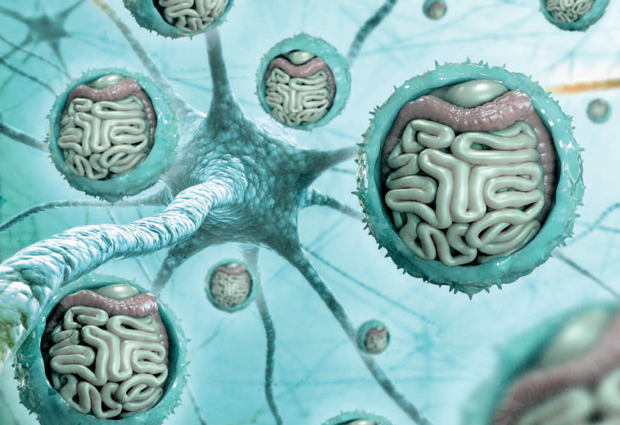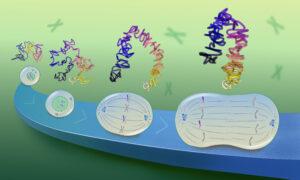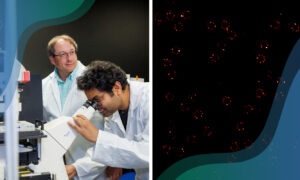
How bacteria affect your wellbeing
Science and Society event answers controversial questions about gut microbes

A record 270 visitors joined EMBL-EBI’s Science and Society event on 31 May titled Gut Feeling: how bacteria influence our wellbeing at Anglia Ruskin University, Cambridge. Three experts in gut bacteria research led the talks and lively discussion. We caught up with them after the event and collected their top ten tips for improving gut health.
Top 10 tips for improving your gut health
- Exercise regularly (especially beneficial for women’s gut health): 30 minutes per day, three times a week.
- Listen to your gut – figure out which foods work for you.
- Ensure your diet is low in saturated fats.
- Eat a wide range of fruit and vegetables (‘eat the rainbow’ of colours).
- Consume plenty of high fibre foods.
- Avoid any food fads or eliminating particular food groups (unless medically necessary).
- Eat minimally processed (‘real’) foods.
- Avoid emulsifiers.
- Include fermented foods, such as sauerkraut and kefir, in your diet.
- Only use antibiotics when absolutely necessary.

Paul O’Toole from University College Cork, Ireland introduced us to the fascinating microscopic world that exists all round us – and within us. Each of our bodies are made up of ten trillion cells, yet we also contain 100 trillion microbe cells – so we are more microbe than human! Infants are born with just a few bacteria that help them to metabolise milk, and then their collection of microbes (their ‘microbiome’) is rapidly populated through interacting with their environment. For most of our lives, this ecosystem is relatively stable, but there are strong links between certain microbes and a range of health issues, including obesity, type 2 diabetes and inflammatory bowel disease.

Simon Carding, from the Quadram Institute and the University of East Anglia, then explored exciting research into gut-brain interactions. The gut has been deservedly named our body’s ‘second brain,’ because it is connected through an extensive network of neurons to our brain. In fact, our gut even produces neurotransmitters, including 95% of our body’s ‘happiness chemical,’ serotonin. Simon’s talk highlighted research linking gut microbes to various conditions including Parkinson’s, Alzheimer’s, Autism spectrum conditions, and a tendency to be overweight. For instance, research suggests that gut bacteria could alter our sense of taste, influence our levels of hunger by mimicking our body’s hormones and may even influence our food choices.

The final talk by Emma Allen-Vercoe, of the University of Guelph in Canada, shed light on how we might improve our microbiome if it gets ‘mucked up’ by, for example, disease or repeated use of antibiotics. The most famous of these potential treatments are probiotics –so-called ‘good’ bacteria. There are also prebiotics, which are non-digestible food ingredients that ‘feed’ the good bacteria. But there is little evidence to demonstrate their effectiveness. There are only a small number of probiotics currently available, and they do not typically colonise your gut in the long term. Moreover, they tend to disappear once you stop taking the probiotic. Many of the products on the market are poor quality and may not even reach your gut intact.
A new, and rather unpleasant-sounding, treatment is a ‘fecal transplant,’ which involves transferring gut microbes from a healthy individual’s stool sample into someone else. This treatment has shown promise, especially for treating C. difficile infections, but they have also had negative effects. Emma’s company, Nubiyota, is looking into developing a similar treatment but with cultured microbes (rather than from poo!). This would allow more control and hopefully avoid unintended cross-infections.

At the end of the evening the audience were invited to quiz the speakers in a 45- minute Q&A session, and the discussions carried on with drinks and nibbles in the University bar afterwards.

EMBL-EBI’s Science and Society events are organised by a committee of PhD students, led by Halldór Stefánsson, EMBL’s Science and Society Manager, and Katrina Costa, EMBL-EBI’s Senior Scientific Engagement Officer. “EMBL’s Science and Society programme brings scientists and the public together to discuss prevalent topics in the life sciences,” says Stefánsson. “The aim of the evening is to make sense of the latest scientific advancements, demystify any misconceptions and encourage a lively discussion.”
The Science and Society programme was established 19 years ago and EMBL-EBI’s annual symposium has been growing rapidly in popularity over the past few years to attract a wide audience from Cambridgeshire and beyond.
Find out more about the evening on Twitter: #EBIscisoc17.


